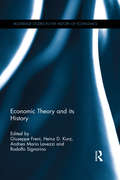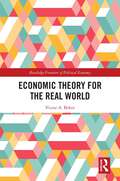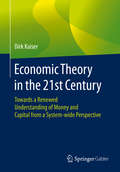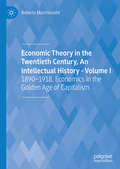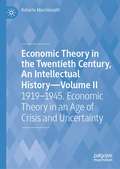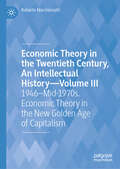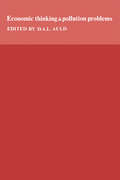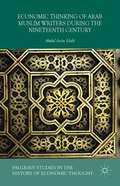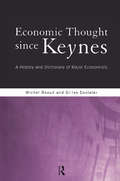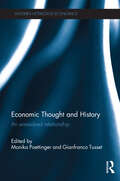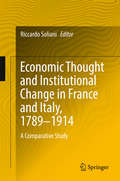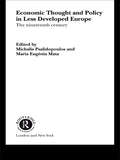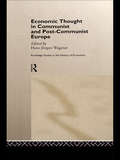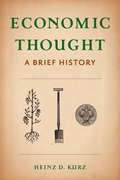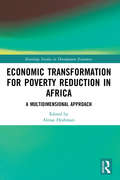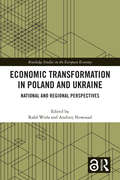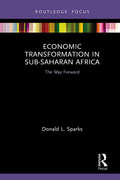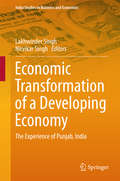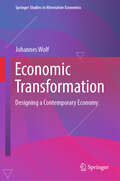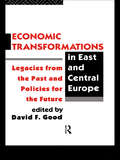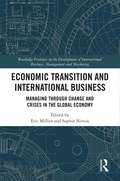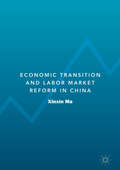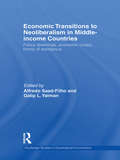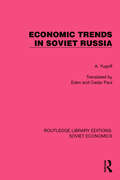- Table View
- List View
Economic Theory and its History (Routledge Studies in the History of Economics)
by Giuseppe Freni Heinz D. Kurz Andrea Mario Lavezzi Rodolfo SignorinoThis collection brings together leading economists from around the world to explore key issues in economic analysis and the history of economic thought. This book deals with important themes in economics in terms of an approach that has its roots in the works of the classical economists from Adam Smith to David Ricardo. The chapters have been inspired by the work of Neri Salvadori, who has made key contributions in various areas including the theory of production, the theory of value and distribution, the theory of economic growth, as well as the theory of renewable and deplorable natural resources. The main themes in this book include production, value and distribution; endogenous economic growth; renewable and exhaustible natural resources; capital and profits; oligopolistic competition; effective demand and capacity utilization; financial regulation; and themes in the history of economic analysis. Several of the contributions are closely related to the works of Neri Salvadori. This is demonstrated with respect to important contemporary topics including the sources of economic growth, the role of exhaustible resources in economic development, the reduction and disposal of waste, the redistribution of income and wealth, and the regulation of an inherently unstable financial sector. All contributions are brand new, original and concise, written by leading exponents in their field of expertise. Together this volume represents an invaluable contribution to economic analysis and the history of economic thought. This book is suitable for those who study economic theory and its history, political economy as well as philosophy.
Economic Theory for the Real World (Routledge Frontiers of Political Economy)
by Victor A. BekerAfter the Great Financial Crisis economic theory was fiercely criticized from both outside and inside the discipline for being incapable of explaining a crisis of such magnitude. Slowly but persistently, new strands of economic thought are developing, to replace the old-fashioned neoclassical economic theory, which have a common characteristic: they are better suited to help understand the real-world economy. This book explores the key tenets and applications of these. The book opens with an explanation of the ‘real world’ approach to economics in which theoretical models resemble real world situations, realistic assumptions are made, and factors such as uncertainty, coordination problems and bounded rationality are incorporated. Additionally, the book explores the ramifications of considering the economy as both a dynamic system – with a past, present and future – as well as a complex one. These theoretical precepts of the real world economy are then applied to some of the most pressing economic issues facing the world today including ecological sustainability, the rise of corporate power, the growing dominance of the financial world, and rising unemployment, poverty and inequality. In each case, the book reveals the insights of the shortcomings of the neoclassical approach which fails to illuminate the complexities behind each issue. It is demonstrated that, by contrast, adopting an approach grounded in the real world has the power to produce policy proposals to help tackle these problems. This book is essential reading for anyone seeking a deeper understanding of the economy, including readers from economics and across the social sciences.
Economic Theory in the 21st Century: Towards a Renewed Understanding of Money and Capital from a System-wide Perspective
by Dirk Kaiser“Criticism of capitalism“ – is it really politically fair and theoretically sound to address important politico-economic issues of our time by use of a terminology that still stems from the times of the Cold War? Money is the other topic. “Toward gold throng all, To gold cling all, Yes, all!” In times of money, which is intrinsically worthless and may therefore be provided in arbitrary amounts by a society, is it really adequate that we still (like Goethe did for gold) regard these petty paper slips as the scarcest resource of them all? In this book, Kaiser provides the reader with surprisingly new insights into the fascinating phenomena of capital and money.
Economic Theory in the Twentieth Century, An Intellectual History - Volume I: 1890-1918. Economics in the Golden Age of Capitalism
by Roberto MarchionattiThis book, set out over three volumes, provides a comprehensive history of economic thought in the 20th century with special attention to the cultural and historical background in the development of theories, to the leading or the peripheral research communities and their interactions or controversies, and finally to an assessment and critical appreciation of economic theories throughout these times. It takes as its subject matter the canon of publications by major thinkers who self-consciously conceived of themselves as 'economists' in the modern academic sense of the term. It is a history of how, when and where the discipline of Economics took root in major universities and scientific communities of economists, and evaluates the emergence of different 'schools' of thoughts. Volume I addresses economic theory in the golden age of capitalism. It considers the contributions of Marshall, Pareto, Wicksteed, Schmoller, Bohm-Bawerk, Schumpeter, Wicksell, Fisher, Veblen and other major thinkers, as well as the universities of Cambridge, Lausanne, Vienna, Berlin, and some others in US, before concluding with a look at the impact that the great war had on the discipline. This work provides a significant and original contribution to the history of economic thought and gives insight to the thinking of some of the major international figures in economics as shown in major works published across the last 130 years. It will appeal to students, scholars and the more informed reader wishing to further their understanding of the history of the discipline.
Economic Theory in the Twentieth Century, An Intellectual History—Volume II: 1919–1945. Economic Theory in an Age of Crisis and Uncertainty
by Roberto MarchionattiThis book, set out over three-volumes, provides a comprehensive history of economic thought in the 20th century with special attention to the cultural and historical background in the development of theories, to the leading or the peripheral research communities and their interactions, and finally to an assessment and critical appreciation of economic theories. Volume II addresses economic theory in the period between the two world wars in which the economic theory went through a process of criticism of old mainstream, deconstruction and reconstruction and theoretical ferment which involved the intellectual communities of economists emphasizing their nature of evolving interacting entities. This work provides a significant and original contribution to the history of economic thought and gives insight to the thinking of some of the major international figures in economics. It will appeal to students, scholars and the more informed reader wishing to further their understanding of the history of the discipline.
Economic Theory in the Twentieth Century, An Intellectual History—Volume III: 1946–Mid-1970s. Economic Theory in the New Golden Age of Capitalism
by Roberto MarchionattiThis book, set out over four-volumes, provides a comprehensive history of economic thought in the 20th century. Special attention is given to the cultural and historical background behind the development of economic theories, the leading or the peripheral research communities and their interactions, and a critical appreciation and assessment of economic theories throughout these times.Volume III addresses economic theory in the period of the new golden age of capitalism, between the years from the end of the Second World War to the mid1970s, which saw the establishment of the new mainstream, in particular in its Harvard-MIT-Cowles version. It was the period of the pre-eminence of the Neoclassical Keynesian Synthesis—the theoretical core of the period’s dominant school of thought.This work provides a significant and original contribution to the history of economic thought and gives insight to the thinking of some of themajor international figures in economics. It will appeal to students, scholars and the more informed reader wishing to further their understanding of the history of the discipline.
Economic Thinking and Pollution Problems
by Douglas AuldThe purpose of this collection is to provide the student with an introduction to the way in which the discipline of economics tackles the problems posed in affluent societies by their various 'waste' products. 'Pollution economics' introduces a student to aspects of price economics, public finance, and political economy in relation to a pressing and complex public concern. The work includes a number of Canadian statements on pollution and its control in this country, and gives the text of two recent pieces of legislation on the topic. The selections in this volume present a wide variety of opinions, ideas, and facts about the economic dimension of the ecological crisis. Pollution costs money--pollution abatement also costs money and these costs will have to be paid somehow by some people. The contributors--politicians, businessmen, and professors--explore the problem of pollution and its control as each sees it, and the volume as a whole should help encourage a greater awareness both of economics as a way of thinking and of the difficulties in making the right public policies.
Economic Thinking of Arab Muslim Writers During the Nineteenth Century (Palgrave Studies In The History Of Economic Thought Ser.)
by Abdul IslahiIslahi explores the state of Arab Muslim economic thinking in the 19th century. Investigating the works of nine distinguished Arab writers from various fields, Islahi concludes that the intellectual, economic and Islamic awakening seen in the 19th century paved the way for the development of Islamic economics in the 20th century.
Economic Thought Since Keynes: A History and Dictionary of Major Economists
by Michel Beaud Gilles DostalerEconomic Thought Since Keynes provides a concise overview of changing economic thought in the latter part of the twentieth century. Part 1 gives an analysis of topics including: * Keynes and the General Theory, * the triumph of interventionism, * the neoclassical synthesis, * the resurgence of liberalism. Part 11 gives a concise biography of the 150 most influential economists since Keynes. This invaluable book will be a useful reference tool for anyone teaching or studying economics.
Economic Thought and History: An unresolved relationship (Modern Heterodox Economics)
by Monika Poettinger Gianfranco TussetEconomic Thought and History looks at the relationship between facts and thought in historical economic research, viewing it in the context of periods of economic crisis and providing detailed analyses of methods used in determining the bond between economic history and economic theory. This interdisciplinary collection brings together international researchers in the history of economic thought and economic history in order to confront varying approaches to the study of economic facts and ideas, rethinking boundaries, methodologies and the object of their disciplines. The chapters explore the relationship between economic thought and economic theory from a variety of perspectives, exploring the relationship between history and economics, and the boundaries defining the history of economic thought, in terms of both single authors and schools of thought. The book offers particular insights on the Italian tradition of thought. The uniquely interdisciplinary and analytical approach presented here bridges the methodological gap between these disciplines, unearthing a fertile common ground of research. This book is intended for Postgraduate students conducting further research into the field, or for professors and academics of economic history and history of economic thought.
Economic Thought and Institutional Change in France and Italy, 1789–1914
by Riccardo SolianiThis book explores the relationship between economic thought, proposals for reform of political institutions, and civil society in the period between the rise to power of Napoleon and the eve of the First World War in Italy and France - two countries with a similar cultural and political tradition and with personal mobility of the intellectual class. The first section of the book is devoted to the struggle for identity, justice, and liberty, including its economic dimensions. The relation between political and economic freedom and its effect on equity is then addressed in detail, and the third, concluding section focuses on the intellectual and political conflict between the social visions of liberalism and socialism in some of their various forms, again with consideration of the economic implications. The comparative nature of the analysis, combined with its interdisciplinary approach to the history of economic and political thought and social history, will enable the reader to understand more clearly the historical evolution of each country and the relevant contemporary political and economic issues.
Economic Thought and Policy in Less Developed Europe: The Nineteenth Century (Routledge Studies in the History of Economics #Vol. 53)
by Michalis Psalidopoulos Maria Eugénia MataThe essays in this volume explore and discuss the process of dissemination of economic ideas among Europe's less developed countries and regions, as well as the interaction between economic thought and economic policy in different times and places during the nineteenth century. The comparative approach adopted sheds new light on the course of economic development in Europe's less developed countries in the nineteenth century and the role played by political economy. Amongst a host of others, the topics covered include: economic policy in Denmark monetary and trade policy in Norway the influence of the German Historical School in Finland land Reform and the abolition of serfdom in Russia and in Poland With contributions that disclose important insights into national traditions in economic thought and policy, and the diffusion of ideas in Europe, this work will be essential reading for all scholars of the history of economic thought.
Economic Thought in Communist and Post-Communist Europe
by Hans-Jürgen WagenerIt is now almost a decade since central and east Europe saw the demise of the Soviet-style economic planning which accompanied more ot less authoritarian political rule by communist parties. The economic thought, based on Marxist philosophy, which formed theoretical underpinning of centrally planned socialist economies, was peculiar to the region,
Economic Thought: A Brief History
by Jeremiah Riemer Heinz D KurzIn this concise and strategic history, Heinz D. Kurz selects major moments in the development of economic ideas to portray the growth of the field and how economic insights are acquired, lost, and reborn. His timeline focuses on the dynamic individuals who give old ideas new life and the historical events that provoke the combination and recombination of different approaches and theories.Kurz begins with classical economics in ancient Greece and concludes with the visionary work of Kenneth J. Arrow and Amartya Sen. Among many other topics, he explains what Adam Smith meant by an "invisible hand"; how Karl Marx's "law of motion" works in capitalist economies; the roots of Austrian economists' emphasis on the problems of information, incomplete knowledge, and uncertainty; and John Maynard Keynes's principle of effective demand and economic stabilization. A final chapter sums up the major concerns of economists today and their relation to world events.
Economic Thought: A Brief History (Routledge Studies In The History Of Economics Ser.)
by Heinz KurzIn this concise yet comprehensive history, Heinz D. Kurz traces the long arc of economic thought from its emergence in ancient Greece to its systematic presentation among the classical thinkers of the late eighteenth and early nineteenth centuries to the influential work of scholars such as Paul Samuelson and Kenneth J. Arrow. With a keen eye for how economic insights are acquired, lost, and reborn, Kurz focuses on the dynamic individuals who give old ideas new life and the historical events that provoke different approaches and theories. Over the course of this journey, Kurz explains what Adam Smith meant by the "invisible hand"; how Karl Marx's "law of motion" works in capitalist economies; the roots of the Austrian economists' emphasis on the problems of information, incomplete knowledge, and uncertainty; John Maynard Keynes's principle of effective demand and economic stabilization; and the insights and challenges offered by growth theory, welfare economics, game theory, and more. He concludes with a deft summation of world economists' major concerns today and their critical relation to world events.
Economic Transformation for Poverty Reduction in Africa: A Multidimensional Approach (Routledge Studies in Development Economics)
by Almas HeshmatiThis book is an edited volume which contains empirical studies on determinants of poverty and its reduction in Africa. It looks at multidimensional measures of poverty, production and productivity-related factors, policies influencing poverty and random, hazardous but preventive factors influencing poverty levels and their reduction. The book argues that we need to account for different dimensions of poverty, when it is measured and classified, and for identifying the determinants of poverty and factors reducing poverty. The studies in the volume provide readers with a comprehensive picture of the state of poverty, its measurement, causal factors and efficient policies and practices in poverty reduction on the African continent as a whole and also in selected countries.
Economic Transformation in Poland and Ukraine: National and Regional Perspectives (Routledge Studies in the European Economy)
by Rafał Wisła; and Andrzej NowosadWhen Poland and Ukraine introduced their political, social and economic system reforms at the beginning of the 1990s, both economies were at a similar level of economic development (GDP $9,500 per capita). However, in 2018, Ukrainian GDP per capita had remained at the same levels since 1991, while in Poland, it had increased significantly, to more than $27,000 per capita. This book assesses the reasons for the growing gap between the level of economic development in Ukraine and Poland. It examines the course of events and evaluates the effectiveness of the system transformations, both in the context of the economy, as a whole, and in individual regions (Polish ‘voivodeships’ (provinces) and Ukrainian ‘oblasts’). It also analyzes the consequences of the 2008–2009 Ukrainian-Russian gas conflict and 2013–2014 Euromaidan events for the Ukrainian economy. Additionally, the authors offer an insight into the migration movements, which have recently been observed in Poland and Ukraine. This is the first comprehensive, comparative analysis concerning the spatial diversification of economic development in these two countries, and the authors highlight the ways in which these reforms have proved effective in Poland and hardly effective in Ukraine. This analysis helps to identify the basic interrelations between the core macroeconomic variables at the regional level and the impact of political events from both a national and regional perspective. The book will appeal to academics, researchers and policy makers interested in the economic and political changes in these two countries, in a comparative setting and on national and regional levels, as well as those working on issues of EU integration.
Economic Transformation in Sub-Saharan Africa: The Way Forward (Europa Introduction to...)
by Donald L. SparksSub-Saharan Africa is vastly diverse, and the 49 countries of the region range significantly in terms of population, size and economic scale. The region also differs in topography, climate, history, culture, languages and political systems. Given this vast diversity, it is, accordingly, difficult to draw general conclusions about the continent’s economic performance as a whole. Additionally, the lack of current statistics for several countries makes it difficult to make accurate assessments of economic conditions. Nevertheless, some broad comparisons can be made: of the world’s developing areas, sub-Saharan Africa has the worst record in virtually all of the most important social and economic indicators: the region has the lowest gross national income per head, the lowest life expectancy at birth, the lowest youth literacy rate, the highest rate of adult HIV infection and the highest number of children not living past five years of age. This volume begins by examining recent economic developments and trends. It then looks at the major economic constraints the region has faced in recent years, breaking down those constraints as either ‘external’ (e.g. terms of trade) over which the individual countries have but limited control, or ‘internal’ (e.g. governance and economic policy), over which there is more control. The book concludes by arguing that, despite the notable challenges cited above, sub-Saharan Africa is poised for a transformation, based on closer regional economic co-operation, a growing middle class, increased demand for locally produced goods and services, and a young population.
Economic Transformation of a Developing Economy
by Lakhwinder Singh Nirvikar SinghThis book traces the development experience ofone of India's most dynamic and prosperous states, Punjab, which hasprovided the country with a much-needed degree of food security. The relativeregression of Punjab's economy in the post-economic reforms period and slowcurrent economic growth give cause for concern. The contributions in this bookaddress the question of why the structural transformation of Punjab's economyhas fallen into the middle-income trap. Each investigates the policyconstraints influencing the relative stagnation of the economy and suggestsappropriate measures for alleviating them. By integrating theoreticalconstructs and new evidence, the authoritative contributions diagnose thenature of the current problems and offer practical solutions. They coverimportant issues such as the crisis of agrarian transition, agrarian marketsand distributive justice, employment growth and transition to non-agriculturesectors, fiscal policy, external factors in economic transformation, andperspectives on rejuvenating the state's economy.
Economic Transformation: Designing a Contemporary Economy (Springer Studies in Alternative Economics)
by Johannes WolfThis book discusses the requirements and preconditions for transforming the economy in order to achieve defined goals while maintaining and utilizing the efficiency of markets. It shows how economic concepts and practices need to be reconsidered and revised in the face of enormous ecological damage and significant economic inequality across much of the world. The book systematizes essential ecological and social targets and presents factors influencing Economic Transformation. Various transformation concepts are discussed with regard to their contribution to adequate economic design and corresponding options for action are developed. Businesses, private households, the state and the commons are involved in these reflections, but also supranational institutions and (civil) society. The ecological compatibility of the economy and the reduction of excessive divergencies in income and wealth are the guiding principles of the overall considerations. In addition, the extent to which the concerns of Economic Transformation are reflected in the government programs of the USA, Great Britain, South Africa and Germany is examined. The book will be of interest to anyone who shares the belief that increasing well-being in a market-oriented society must go hand in hand with ecological compatibility and improved social equity, both globally and within societies.
Economic Transformations in East and Central Europe: Legacies from the Past and Policies for the Future
by David F. GoodIn The Economic Transformations in East and Central Europe the contributors argue that the area's economic history over the last century contains vital legacies that will shape its economic future. The book is an invaluable guide to understanding the current and future problems of this volatile region, and includes analysis of individual countries
Economic Transition and International Business: Managing Through Change and Crises in the Global Economy (Routledge Frontiers in the Development of International Business, Management and Marketing)
by Eric Milliot Sophie NivoixEconomic Transition and International Business brings together academic experts in International Business and sheds new light on the international phenomenon of transitions in the worldwide economy. It includes both academic investigations as well as in-depth empirical studies. The purpose of the book is to investigate how international transitions reshape the environment, as they reallocate and renew activities, and create new strategies for actors and stakeholders. It provides essential insights into a number of contextual changes that organisations are facing internationally, and is structured around three complementary themes. In the first part, recent economic and financial crises are analysed and presented as revealing transitions for the business world. In the second part, the impact of these transitions is assessed at the level of various key economic players in today’s societies (states, business networks, companies, associations, etc.). In the third part, certain decision-making and managerial transitions are retained to illustrate the new deal linked to international transitions. This book is recommended reading for scholars and students in management and economics, as well as international business managers. They will find insightful information, either theoretical or practical, including various countries impacted by socio-economic transitions.
Economic Transition and Labor Market Reform in China
by Xinxin MaThis book empirically investigates the changes in labor market structure accompanying the labor market reform in China by focusing on the labor market segmentation problems from the 1980s to 2013. The book also aims to examine the effect of labor policy reforms on individual, household and enterprise behavior, including the causes and consequences of labor market reform in China, particularly the influences of labor policy reforms on labor market performance. Offering valuable insights into the changing structure of the Chinese economy, this book will be of interest to scholars, activists, and economists.
Economic Transitions to Neoliberalism in Middle-Income Countries: Policy Dilemmas, Crises, Mass Resistance (Routledge Studies In Development Economics)
by Alfredo Saad-FilhoNeoliberalism is based on the systematic use of state power to impose, under the veil of ‘non-intervention’, a hegemonic project of recomposition of capitalist rule in most areas of social life. The tensions and displacements embedded within global neoliberalism are nowhere more evident than in the middle-income countries. At the domestic level, the neoliberal transitions have transformed significantly the material basis of social reproduction in these countries. These transformations include, but they are not limited to, shifts in economic and social policy. They also encompass the structure of property, the modality of insertion of the country into the international economy, and the domestic forms of exploitation and social domination. The political counterpart of these processes is the limitation of the domestic political sphere through the insulation of ‘markets’ and investors from social accountability and the imposition of a stronger imperative of labour control, allegedly in order to secure international competitiveness. These economic and political shifts have reduced the scope for universal welfare provision and led to regressive distributive shifts and higher unemployment and job insecurity in most countries. They have also created an income-concentrating dynamics of accumulation that has proven immune to Keynesian and reformist interventions. This book examines these challenges and dilemmas analytically, and empirically in different national contexts. This edited collection offers a theoretical critique of neoliberalism and a review of the contrasting experiences of eight middle-income countries (Brazil, China, India, Mexico, South Africa, South Korea, Turkey and Venezuela). The studies included are interdisciplinary, ranging across economics, sociology, anthropology, international relations, political science and related social sciences. The book focuses on a materialist understanding of the workings of neoliberalism as a modality of social and economic reproduction, and its everyday practices of dispossession and exploitation. It will therefore be of particular interest to scholars in industrial policy, neoliberalism and development strategy.
Economic Trends in Soviet Russia (Routledge Library Editions: Soviet Economics #5)
by A. YugoffEconomic Trends in Soviet Russia (1930) examines the economic position of the USSR a decade after the Revolution. It displayed the contradictions evident in an economy that had been isolated from the world economy while undergoing great changes, and where the government was taking control over all aspects of economic life. Huge factories had been established, yet the countryside remained pre-industrial; and while the economy was in theory entirely under State control, in practice currency crises, crises of production, gluts, crises of demand, pressed hard on one another’s heels, and were renewed again and again by the spontaneous play of economic forces.
